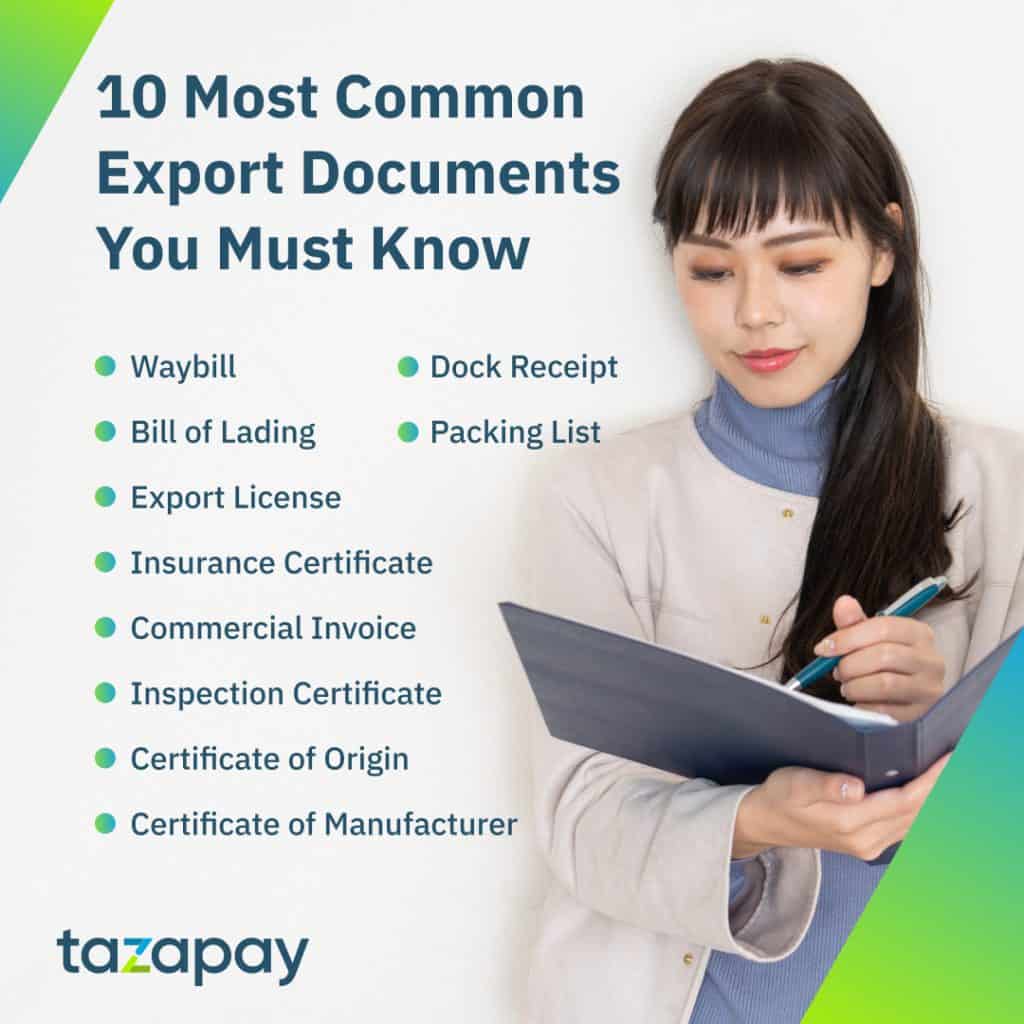- Home
Blog Blog
Customs & Incoterms Customs & Incoterms
10 Common Export Documents to Ensure Success Abroad
10 Common Export Documents to Ensure Success Abroad

The success of internet-driven marketplaces has opened up multiple avenues for sales and overseas exports. While this comes as good news to small and medium enterprises, it is also imperative that you gain a considerable amount of knowledge of import and export procedures before shipping your goods overseas. Let us take a look at the documents you may need to put together to be a successful exporter.

Waybill
The Waybill, also referred to as Air Waybill or AWB, is possibly the most important document you will need to export your goods to a foreign country. The Waybill is usually issued by the carrier who transports the goods overseas. It contains a description of the dimensions of the package and the specifications of its contents. It also contains the source and destination addresses and the tracking details of the consignment. It is used by the customs authorities to verify the package during the export process.
Bill of Lading
Another important addition to your export documentation portfolio is the Bill of Lading. The Bill of Lading specifies the terms negotiated by the importer and the exporter. It could be non-negotiable or negotiable. This means that it could specify a particular person or the representative of the importer who will receive the consignment or it could say that anyone in possession of the Bill of Lading is entitled to take possession of the goods at the destination.
Certificate of Manufacturer
Your export procedure and documentation remain incomplete without a Certificate from the manufacturer. If you are both the manufacturer and exporter, you will need to issue a notarized document declaring that the products in the consignment have been manufactured by you and that the goods that have been produced adhere to the general requirements stated by the importer, and are ready to be shipped.
Certificate of Origin
Most countries allowing the import of goods require a Certificate of Origin, specifying the country from which the product is originally sent. This certificate is normally issued by a Chamber of Commerce
They are generally required for any of the following reasons:
1. Quantum of Import duty to be levied:
Some importing countries prohibit import of goods from certain countries and some countries encourage import of goods from certain specified countries and levy lower or nil custom duties
2. Trade under aid agreements / Boycott of goods:
Some donor countries often require recipients of aid to import goods from their own (donor) country or from a group of donor countries. Some countries prohibit the importation of goods from certain countries for political reasons
3. Marketing:
Often buyers prefer that certain goods originate from specific countries which have a good reputation for producing quality products; consequently, importers may require documentation to evidence the country of origin.
Commercial Invoice
A Commercial Invoice is issued by the seller to the buyer. This bill mentions out the names and contact details of both parties and also specifies all details about the product and pricing. This is issued by the seller at the time of dispatching of goods.
Doc Receipt
A Dock Receipt is usually issued by the carrier upon receiving the shipment for transport. This transfers the accountability of the goods from the exporter to the carrier who is responsible for its safe custody and transportation, till it is received by the recipient
Inspection Certificate
An Inspection Certificate or a Pre-Shipment Inspection Certificate is sometimes required by importers. It is a document issued by a third-party inspector who inspects the goods before dispatch and certifies that they match the specifications of the order placed by the buyer.
Export License
An Export License is a document issued by the government of the exporter’s country, granting permission to sell the specified goods to overseas buyers.
Insurance Certificate
Most exporters insure their goods against damage or loss during transit because this is a risk that they bear. Once insured, the insurance company issues a certificate of indemnity which becomes part of the export documentation portfolio.
Packing List
A Packing List is issued by the exporter if a large number of goods or different types of goods are exported together. It is a detailed list of the number of items and their specifics. It also specifies the carton, crate, or packaging of the goods. Additionally, Packing list also lists Gross & Net weight, Measurement of packages & Indicates the shipping marks, if any
If you are unclear about the documentation necessary to export goods to any specific country, it may be a good idea to check with popular escrow platforms and service providers such as Omoney. These offer knowledge banks and sample documents as well.
Category

Customs & Incoterms
10 Common Export Documents to Ensure Success Abroad
Related Articles

DDP vs. DAP vs. DAT: Understanding the Difference

2010 vs. 2020: What Has Changed in Incoterms






